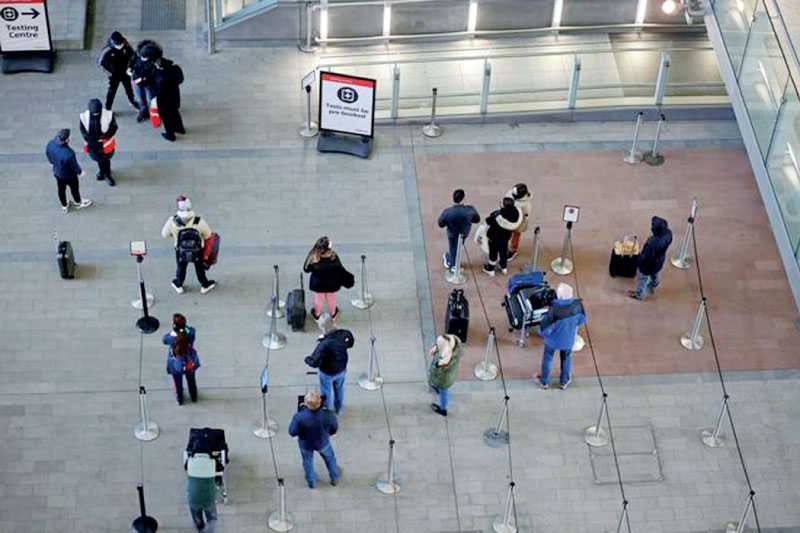Thursday Feb 19, 2026
Thursday Feb 19, 2026
Monday, 12 April 2021 02:06 - - {{hitsCtrl.values.hits}}

People queue for COVID-19 tests at a testing centre, as tighter rules for international travellers start, at terminal 2 of the Heathrow Airport, amid the spread of the coronavirus disease (COVID-19) pandemic - Reuters
London, (Reuters): Major British travel company Jet2 said it was cancelling holidays until late June, blaming uncertainty from UK government plans for restarting international travel that were widely condemned by airlines.
Carriers had been counting on government proposals published on Friday to kick off a summer getaway season, but the industry criticised the release for not including a start date for travel or listing which countries would be open for holidaymakers.
Instead it will give more details in early May, ahead of a possible resumption of international travel on 17 May, after a year of severe restrictions during the coronavirus pandemic.
Jet2, the UK’s third largest carrier by passenger numbers, said it had cancelled flights and holidays to June 24.
“We just don’t have enough certainty at the moment with which to commit to a 17 May start date,” Jet2 Chief Executive Steve Heapy told Reuters.
“The uncertainty is just a killer.” Competitor airlines and travel companies still hope to be able to open some routes from 17 May, but they warn that expensive COVID-19 testing requirements will dent demand.
The government has proposed a traffic light system, with countries falling into red, amber or green categories based on the degree of COVID-19 risks. Green countries will require a PCR test for travellers, which costs over 100 pounds ($ 135) each, once they arrive back in the UK, while amber and red countries will require holidaymakers to quarantine as well.
The country’s largest airline, easyJet, said that would mean that only wealthy people could take holidays abroad as the cost of the test would exceed some of its ticket prices.
Jet2 said that the tests would add about 20% to the average cost of a holiday for a family of four. Its shares fell 5%, after a more than 50% gain in the last six months.
Britons have embraced the era of low-cost travel over the last 20 years and are among Europe’s highest spending tourists. In 2019, more than six in 10 Britons took a foreign holiday.
But before the summer season can take off, airlines need to retrain pilots and holiday companies need to take on seasonal staff, both for operations at home and in resort.
Jet2 said it needs to hire up to 3,500 staff to reopen resorts in countries like Spain, Greece and Turkey. It does not expect many destinations to open for May but hopes they will from 24 June.
The government has said it will review its plans again in late June.
TUI, the world’s largest holiday company, said customers due to travel between 17 May and the end of July are already able to switch dates for free, but it has not decided to cancel bookings yet.
The United States, Portugal, Malta and Israel have been mooted as possible green-list destinations.
Airlines and travel companies are desperate for a bumper summer after a year of scant business. Without a high level of unrestricted travel, many could be left struggling to survive or needing fresh funds.
Airlines UK, an industry body representing British Airways, Ryanair, Virgin Atlantic and others, criticised the government proposals as “a further setback for an industry on its knees”.
Global airlines body IATA said that 860,000 jobs in Britain were currently at risk from the travel hiatus.
The airlines called on the government to reassess its plan for PCR tests, suggesting cheaper lateral flow tests instead, or no testing for those who have already been vaccinated.
Britain is among the world leaders in vaccinating its population against COVID-19.
Transport Minister Grant Shapps said the government wanted to make testing for travel cheaper. “We are committed as a government to work to drive those costs down, and also in time of course review potentially the type of test,” he told the BBC.
Coronavirus case numbers in Britain have dropped dramatically since a January peak under a strict lockdown which banned holidays. But the government now fears the arrival of vaccine-resistant variants from abroad that could undermine the inoculation program.